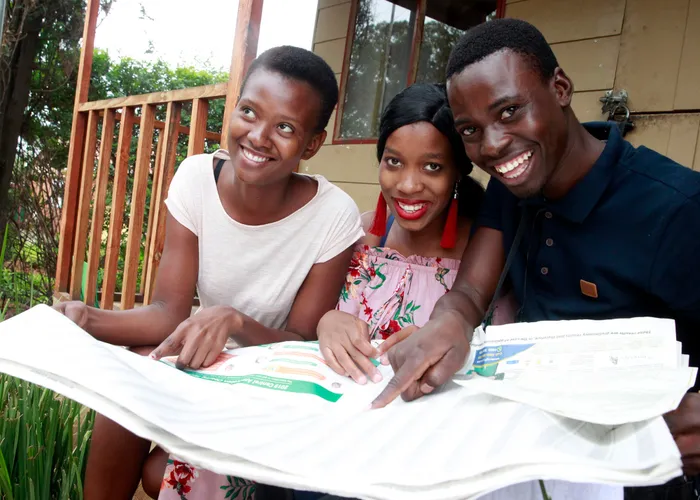Matric: Hope for those who do not obtain university pass

A file picture of Kwena Mphel, Tinocia Makgoba and Mixo Mthombeni checking their matric results in the newspaper. Picture: Jacques Naude/African News Agency (ANA)
Pretoria - Matrics who do not pass their National Senior Certificate have been urged to remember that the word “fail” has no place in a post-modern society – “insufficient achievement” should do.
After confirmation by the education quality assurance body, Umalusi, that the results will be released on Thursday, and the marks available at schools on Friday, the eyes of the country will once more be returning to the outcome of the class of 2022.
And although the focus would be on the matrics who obtained university entrance, educational experts assured pupils and parents that there was hope for those who did not.
Professor Kobus Maree, of the Department of Educational Psychology at the University of Pretoria, advised pupils and parents that although their current marks would co-determine whether they would be accepted into their preferred field of study, this would not determine whether they would be successful or not in life itself.
Maree added that not receiving the ideal marks would also not meaningfully limit their career-life prospects.
“Yes, it hurts when one learns that the outcomes of an examination were less successful than expected. Therefore, in such instances, it is advisable to step back emotionally and interpret the experience logically. All human beings experience success, and all human beings are less successful from time to time. This is the most normal thing in the world.
“Over time, we grow accustomed to this ebb and flow of experiences. Reflect carefully on your success but also on your less successful attempts, including the current one. Feel good about the first and be motivated by the second.”
Maree urged pupils to remind themselves that there were other opportunities to be more successful and for them to try to see what happened instead as an area for growth or development, and even a golden opportunity to demonstrate their resilience to be adaptable.
Aside from maintaining a positive outlook, Maree said pupils could also apply for a remark of their papers, register for and write supplementary exams, or re-do their grade or repeat certain subjects, as there was no ‘one size that fits all’.
“Yes, research has shown that people with degrees usually find employment more easily and earn a higher salary than their competitors. However, one should not underestimate the value of non-university study,” he said.
“Naturally, parents will feel disappointed when their children are less successful, but looking back and focusing on what might have been serves little purpose.
“Parents should be part of the transition from less to more sufficient achievement, reassure their children, and communicate openly. Ask them how they feel, and, most importantly, listen carefully to their responses.”
Kathy Knott, a counselling psychologist and the programme manager of Good Work Foundation’s Bridging Year Academy, shared similar sentiments. She said that from first-hand experience she could assure parents that less-than-perfect results were no need for despair.
Knott said that more than anything it was important for pupils to be kinder to themselves and see this as an opportunity to dig into their reserves of resilience, grit and determination, and banish any notions of self-criticism.
Knott detailed that through the organisation they had witnessed the success stories of many graduates who were able to push themselves and gain the self-belief to find their niche.
She advised those who did not achieve what they wanted to do to consider free online resources and to do their homework on what their specific course requires and the alternatives available.
Pretoria News